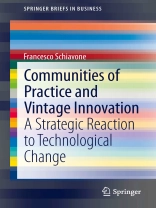This book focuses on the notion of “vintage innovation” and its application in various old technology-based communities of practice. Some communities of practice resist and react to technological change by adopting new technological products (“vintage products”) that extend the lifetime of their old, favored products and practices. There are a number of potential reasons for such strategic reactions, which are analyzed by the author. The book opens by reviewing the nature of technological change. Old technology-based communities of practice and their typical reactions to technological change are then discussed, and the concept of vintage innovation, introduced and explained. The book presents four case studies of communities of users in which vintage innovation emerged: analog photographers, radio amateurs, arcade videogame players, and disc jockeys.
表中的内容
1 Technological change.- 2 Communities of practice.- 3 Vintage innovation.- 4 Vintage innovation by firms.- 5 Vintage innovation by users.
关于作者
Francesco Schiavone received the Ph.D. degree in network economics and knowledge management from the Ca’ Foscari University of Venice, Italy, in 2006. Since 2007, he has been an Assistant Professor in management at University Parthenope, Naples, Italy. He is also a Visiting Professor in theory of the firm at the University de Castilla, La Mancha, Spain, and innovation management in ESG Management School, Paris, France. He was a Marie Curie Research Fellow at the University of Twente, The Netherlands, in 2004. Since 2010, he has been involved in research on strategic reactions to technological change by companies and communities of users. His current research interests include technological change, innovation, business strategies, and entrepreneurship. Dr. Schiavone has been serving as the Guest Editor of special issues and is a member of the Editorial Boards from various international journals. Since 2012, he has been a member of the scientific panel of the International Society for Professional Innovation Management (ISPIM).












